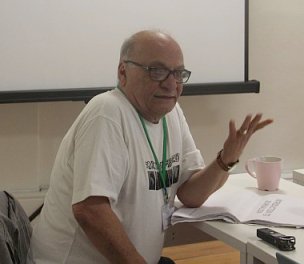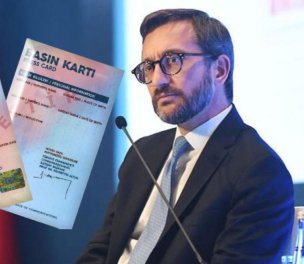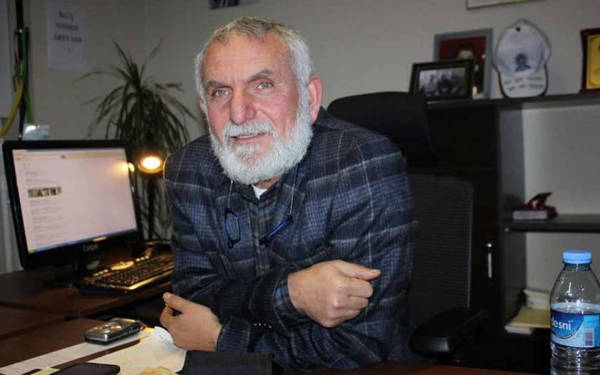Eyüboğlu and Mater at the courthouse.
Click to read the article in Turkish / Kurdish
The Presidency Communications Directorate has submitted its defense in the case filed by IPS Communication Foundation Chair and bianet Project Advisor Nadire Mater for her press card not being renewed for three years.
The directorate's defense revealed that it had revoked Mater's permanent press card without notifying her.
The directorate said a press card is not a requirement for journalism and its cancellation did not constitute an obstacle to the profession. "Considering that there are hundreds of journalists who carry out journalism without a press card, it is evident that press cards are not an indispensable element to do journalism."
The case filed by Mater was unjustified, unfounded and lacked legal basis, according to the directorate.
The reason for the cancellation of the card was a prison sentence Mater received in 2017 for having participated in the "Editors-in-Chief on Watch" campaign in support of the now-shuttered Özgür Gündem newspaper, it said.
'Criminal records are not reliable'
Mater's attorney Meriç Eyüboğlu noted that she has been a journalist for 40 years and had a "permanent press card" for 15 years. Mater is among many journalists whose cards were not renewed after a new press card regulation came into force in 2018, she added.
As the other journalists, they were not able to receive a response to their applications to the directorate regarding the issue, said the attorney. "As we always say, we can't find an interlocutor. We follow the process from Presidency Communications Director Fahrettin Altun's emails."
"As many journalists did, we filed a case by applying to the administrative judiciary and we have now learned that the criminal recordings, which our state keeps by establishing enormous directorates and employing many people, are not reliable!"
Despite a delay of two and a half years in the renewal process, the Communications Directorate said the process was underway and such delays were normal as the directorate's realm of authority expanded, said Eyüboğlu.
The directorate alleged that Mater lost the quality to possess a permanent press card because she was convicted of a "terrorism-related" offense, she said, adding that this was how they found out that Mater's card was revoked.
"However, the criminal recordings are not right since there is not a final verdict of conviction," she said, adding that the case is currently pending at the Court of Cassation.
"The Communications Directorate, on the other hand, says this sentence is included in Nadire Mater's criminal record. How is that possible? They are so willing to register convictions in criminal records but so reluctant when removing them! Of course, it's a different story if the Communications Directorate doesn't need a final court verdict to cancel a permanent press card!
"However, it is one of the most basic principles of law that a verdict must become final to talk about a conviction. If it is not final, a conviction can't be mentioned. Of course, this can be the case in a country where not only citizens but also rulers are bound by the rules of law.
"Let alone a delay of more than two years, —this period is three years and 31 days in the case of Nadire Mater— not giving a response [to applications] can't be the case in a state of law.
"Had the Communications Directorate concluded that there was a final conviction regarding Nadire Mater and notified [us] that it had canceled the press card for this reason, we would show that the case is the Court of Cassation and make it correct this mistake by submitting documents.
"However, from many examples regarding other journalists and Fahrettin Altun's statement after the Council of State verdict that 'We'll struggle against those who make terrorism propaganda under the guise of journalism as long as we are on duty,' we know that this attitude was intentional.
"We will continue to say that this attitude clearly violates the principles of legal certainty and legal security, which are the most important parts of the principle of rule of law. Maybe other courts will hear this."
Press cards in Turkey and in the worldBefore 2018, press cards would be issued by the General Directorate of Press and Information, which was affiliated with the Prime Ministry. Since 2018, the turquoise press cards have been issued by the Presidency Communications Directorate. The Press Cards Regulation, which came into effect on December 14, 2018, has been the 14th press card regulation since 1947. In the world, press cards are generally issued by trade unions. Journalists oppose being "journalists of the state" almost everywhere in the world. Because once they acquire the "right" to issue press cards, they exercise the "right to not issuing press cards." This is the purpose anyway; interfering with news through press cards and keeping censorship and self-censorship in practice. England, Finland, Italy, Croatia, the Netherlands, Norway, Sweden and Austria are among the countries where press cards are issued by the trade unions. In Germany, there is no single authority that issues press cards. In China, press cards are issued by the state. Journalists experience delays and cancellations in the issuance of press cards, can be blacklisted, tried and put in prison. |
(HA/VK)














